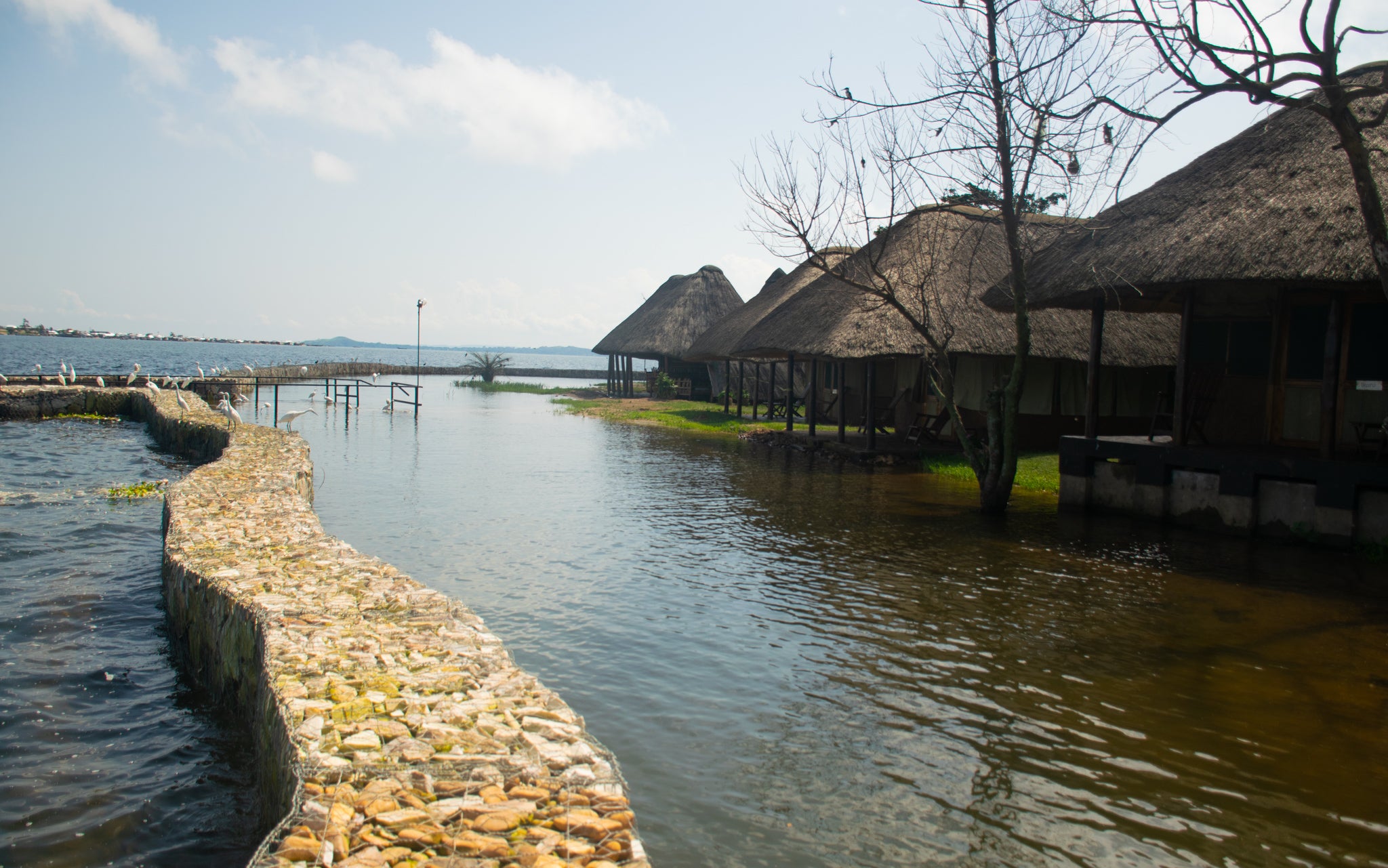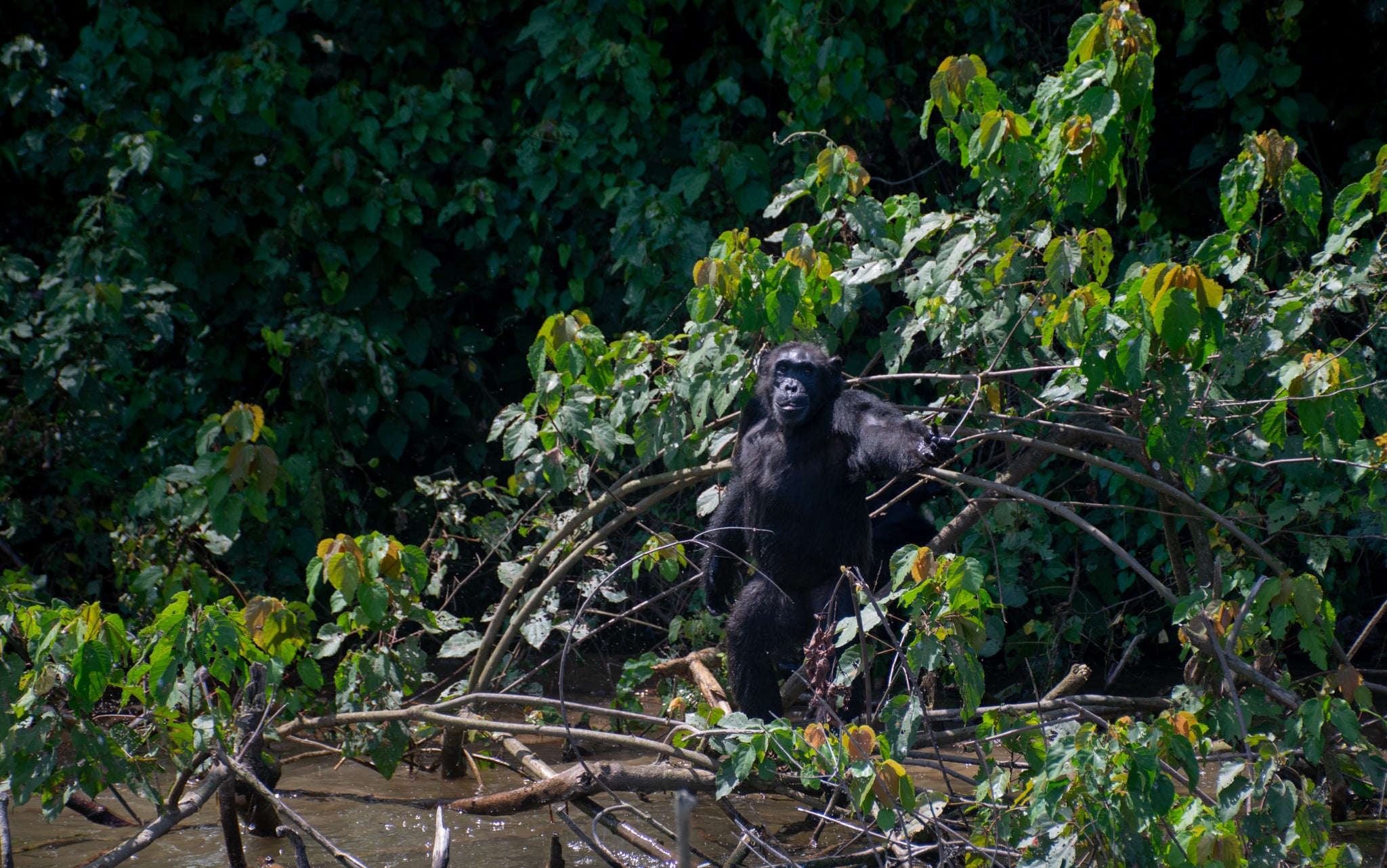The battle to save Uganda’s chimpanzee island
Ngamba Island serves as a sanctuary for chimps but is now at risk from extreme weather. Federica Marsi reports from Lake Victoria

When rangers stormed a wildlife traffickers’ hideout in a remote corner of western Uganda, a caged chimpanzee stared back at them, her human-like limbs bound by heavy chains.
Africa – as the chimp was later named by her rescuers – was about to be sold to the highest bidder at a lucrative price. Large numbers of chimpanzees are being captured in Uganda and flown to zoos as far away as Russia, and prices can reach $10,000 (a little over £7,000).
Some are sold as pets, shipped to labs, or killed for bushmeat. Over the course of a few decades, their population is estimated to have dropped from tens of thousands to around 5,000.
Africa is among 51 rescued apes currently sheltered in Uganda’s chimp paradise – a 95-acre forest-cum-sanctuary island that breaks the broad expanse of Lake Victoria.
Its secluded location has offered an oasis of peace to the orphaned and traumatised since 1989, but the Covid-19 pandemic and an exceptional rise in the lake’s water levels are now putting the future of this primate heaven at stake.
Joseph Masereka, one of the carers at Ngamba Island Chimpanzee Sanctuary, used to welcome the tourists, who embarked in Entebbe for a 45-minute scenic boat ride that crossed over the equator. Last year, as tourism ground to a halt and bookings fizzled, the island also lost access to a large chunk of its reception facilities.
“Sorry for the water,” Masereka tells me as he leads the way along a path dotted with potholes. “We used to gather here,” he says, pointing a finger at a picnic area where a bench is partially submerged. “Now it’s all gone.”
When the lapping water reached the guest houses, assembly point and restaurant, the Chimpanzee Trust – the NGO responsible for all aspects of the sanctuary – stacked stone-filled gabions around parts of the island’s perimeter.
Yet the water rose by around 78 inches, swallowing half of the residential area.
From a raised deck on the edge of the enclosure, Masereka looks out over the vast wooded section that is home to the chimps. Five fruit trees are now out of reach to them, and the organisation – which is facing soaring maintenance costs alongside the slump in revenues – must compensate for the loss with extra meals.
Masereka, who calls all the chimps by name and can interpret their every whim, never tires of his duties. “They always surprise you,” he says, throwing large stacks of fresh fruits over the fence as the apes excitedly vie for his attention. “Whenever you don’t expect them to do something, they do it.”
Pasa, for instance, taught her friend Yoyo to lift the electrified fence with two wooden sticks and roll beneath it. When the water level rose, part of the electric fence that keeps the chimps separate from the inhabited area had to be deactivated, making what carers call an “escape” all the more likely.
Joshua Rukundo, director of the Chimpanzee Trust, tells The Independent that the pandemic and the rise in water levels have had a hard financial impact on the organisation. “It has been a very big challenge; we have [launched] a lot of fundraising campaigns,” he says, before thanking the international partners who have heeded his calls for help.

Despite the difficulties, Rukundo is determined to continue protecting this endangered species. During Uganda’s six-year-long Bush War, which began in 1980, rebel groups fighting government forces used wildlife trafficking as a source of revenue. Chimps, who share 98 per cent of their genetic make-up with humans, could be sold at a lucrative price for unauthorised biomedical research.
Those rescued were housed in zoos – and later in newly established wildlife rehabilitation centres – but, as their numbers soared, an alternative location had to be found. “The sanctuary was born to provide a home to chimpanzees who had experienced trauma, before reintegrating them into the wild when possible,” Rukundo says.
Only around 200,000 specimens remain in the wild on the entire African continent. Their numbers are projected to decline by 80 per cent by 2050, according to the Jane Goodall Institute, due to diseases, poaching, and habitat loss.
Keeping biodiversity afloat is becoming a challenge for places like Ngambe island, which are vulnerable to extreme weather events. The rise in water levels significantly affected shoreline communities in Uganda, Kenya and Tanzania, all of which border Lake Victoria, and along the Nile River, the lake’s main outlet.
“The rainfall in Lake Victoria [has been] above average since May 2019,” Modathir Zaroug, regional water resources modeller at the Nile Basin Initiative Secretariat, tells The Independent. In October 2019, water levels rose a staggering 79 per cent, and kept rising way more than average until May 2020, flooding farmland and compounding the environmental impact of human activities.
While a similar rise was recorded in the first half of the 1960s, “climate change could exacerbate this phenomenon”, Zaroug says. Warmer sea temperatures in the western Indian Ocean region have caused heavy rain in parts of eastern Africa, a phenomenon known as positive Indian Ocean Dipole.
Future forecasts are complicated by the sheer size of the lake, which measures 26,828 sq m – over half the size of England. While smaller lakes gain water from affluent rivers, Africa’s largest gains most of its mass from rainfall.
“The weather, therefore, will have a major impact on its water balance,” Jens Kristian Lørup, senior hydrologist at the United Nations Environment Programme (UNEP), tells The Independent.
Extreme events like floods and droughts are not a novelty. Yet they are rising in frequency.

“These kinds of phenomena are very concerning and must be taken very seriously,” Lørup, who is part of the UNEP’s Centre on Water and Environment (UNEP-DHI), says.
Climate change is likely to be a contributing factor, as warmer air contains more water and, in turn, generates more rainfall. “If this is true within the area of the Nile Basin and Lake Victoria, this could mean that we will see these events more frequently, and the impacts they carry with them,” Lørup says.
For his part, Rukundo says relocating the chimps is not an option. Land tenure has become a sensitive issue in Uganda, where agricultural land is required to respond to the needs of a growing population.
“Wildlife is being squeezed out because of new plantations,” he says. Despite the mounting challenges, Rukundo has no intention of allowing Ngamba to become the next paradise lost.
Join our commenting forum
Join thought-provoking conversations, follow other Independent readers and see their replies
Comments